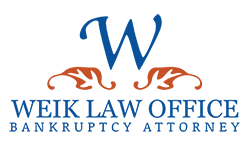GET HELP TODAY
A typical Chapter 13 bankruptcy case may last anywhere from three to five years. A lot can happen during that time, and you may find yourself defaulting or no longer able to keep up with the originally agreed to repayment plan. Some common reasons for this may include increased expenses, emergencies or illness. Fortunately, you don’t have to just sit and wait for your case to be dismissed. Bankruptcy laws allow people to seek out other options to save their bankruptcy and obtain a discharge. With help from an our experienced professionals at Weik Bankruptcy Attorney in Raleigh, below are some legal actions you can take.

Amend the Plan or File a Motion to Modify
When you file for bankruptcy, a proposed repayment plan is one of the essential documents included in the packet you send to the court. The plan usually stays in a temporary probationary period until the court, your creditors and the trustee can review them. If none of them object to the proposal, or if all objections get resolved, then the court will finalize it.
Your lawyer may file a modification anytime before or after court confirmation. If you do file prior, you simply need to present an amended plan, provide an explanation as to why, and wait until the court confirms the latest filed plan. If for some reason you do wish to modify the plan after the confirmation, your lawyer will need to file a motion for modification, present proof that your circumstances changed and explain why it is necessary to alter the previous plan.
Hardship Discharge or Convert to Chapter 7
There are two ways to get a quick discharge of your debt even if you’re unable to continue with Chapter 13. One way is to request a hardship discharge before plan completion, provided that you are eligible. The court will analyze your financial situation and determine if granting a hardship discharge is indeed the right decision for all parties involved. It is worth noting that if the court agrees to a Chapter 13 hardship discharge, you will be subject to the same limitations as that of a Chapter 7.
The other option is having your lawyer convert your Chapter 13 bankruptcy to a Chapter 7. You must provide evidence that you now qualify for Chapter 7 bankruptcy since your current circumstances make it impossible for you to afford the Chapter 13. Keep in mind though that a Chapter 7 bankruptcy does not discharge priority debt or allow you to catch up with mortgage arrears.
Hitting a few bumps on the road shouldn’t deter you from accomplishing your goal of becoming debt-free. With our professional help at Weik Law Office, you can be back on track in no time. Call us today at 919-845-7877 for a free consultation, and set up a time to speak with one of our professionals.
Sources:
How to Modify Your Chapter 13 Repayment Plan, TheBankruptcySite.org
What Happens if You Don’t Make Your Chapter 13 Plan Payments?, AllLaw.com
